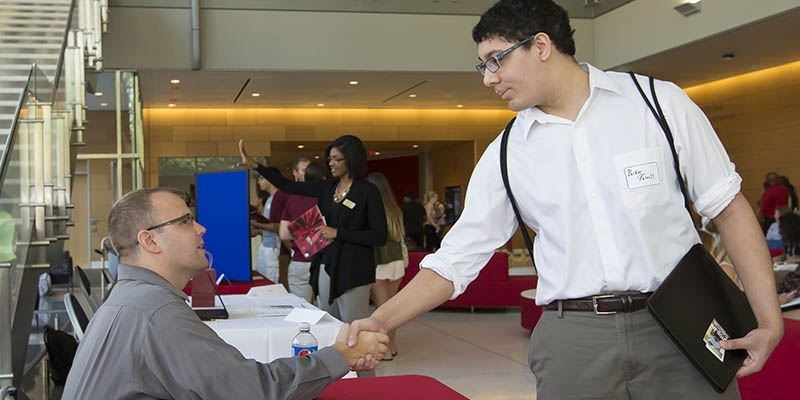Posted October 16, 2015
Career Center expands opportunities for students

Betsy Manning
Career communities give students the opportunity to explore interests and careers outside of their majors.
A political science major lands a job at TD Bank. An adult and organizational development major finds her professional home running interactive workshops for kids visiting the Franklin Institute. A history major applies his analytical skills at Comcast.
Today’s job market is fluid and students’ paths aren’t always determined by their majors. To better reflect that professional landscape, Temple University’s Career Center has found a new way to serve students.
Called career communities, the new strategy helps students break out of the confines of their majors by indicating interest in broader categories that represent industries and professional fields, such as biotech and pharmaceutical, health and human services, and engineering and information technology. In addition, the Career Center has reorganized its own structure and services to align with the career communities concept.
“This is a way to increase opportunities for students,” said Rosalie Shemmer, senior director of the Career Center. “Career communities will open up new pathways and break down silos.”
Majors and beyond
Instead of receiving advice and information based only on their majors, students now select their career communities by logging in to the OwlNetwork, which features a new platform. Under the Academic Profile and Settings tabs, they’ll find a list of the 11 communities the Career Center offers. Students can select as many areas as they like—the Career Center suggests three—and change them at any time.
"For many students, they don’t fit in one box or major. They have skills and talents that can be applicable to different professions.”
-- Anthonia Allanah, Class of 2016
After they select their areas, students receive information about events, organizations and job or internship opportunities based on the areas they’ve chosen.
“We encourage students to have crossover,” Shemmer explained, to expose them to opportunities they might not have considered or been aware of. For example, a Tyler art history major would likely select the arts and education categories, but by also choosing government and nonprofit, might find an internship doing research for Philadelphia’s Office of Arts, Culture and the Creative Economy. Internships are the most common way students end up in jobs outside those that are typical for their majors. Career communities will increase those possibilities.
“I am a criminal justice major, but I am looking to get my master’s [degree] in higher education,” explained Anthonia Allanah, Class of 2016, who works at the front desk in the Career Center. She selected education, government and nonprofit, and law and legal studies as her areas of interest. “That’s why I like the career communities—because you pick things based on your interests. For many students, they don’t fit in one box or major. They have skills and talents that can be applicable to different professions.”
Likewise, the Career Center itself is evolving: Instead of focusing on the traditional top-down workshops and presentations, the staff fosters direct connections between students, alumni, mentors and employers, mirroring a professional landscape that values initiative and the sharing of ideas. A student who doesn’t want to stay within the confines of a major could thrive at a startup that encourages all employees to bring innovative ideas to the table.
The Career Center began to incorporate the career communities concept as it undertook an expansion beginning in January 2015. With a staff that has doubled and through partnerships with Temple’s schools and colleges, student engagement increased by 22 percent within the first five months.
—Theresa Everline
Related stories